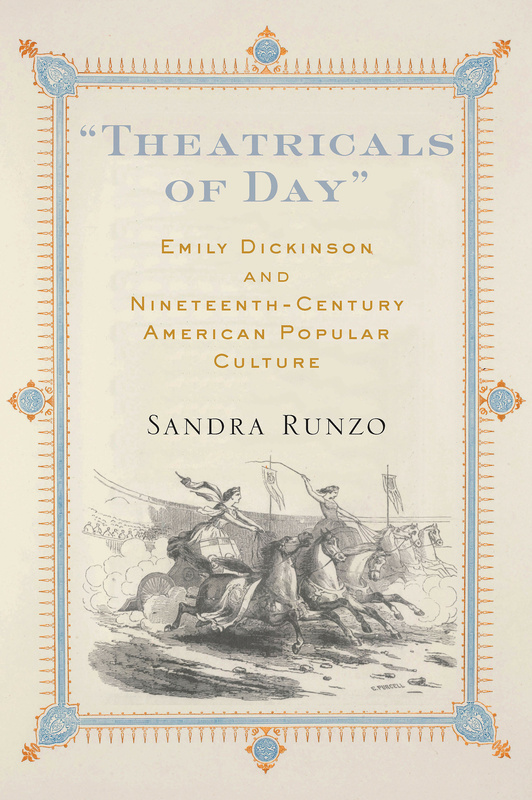"Theatricals of Day"
Emily Dickinson and Nineteenth-Century American Popular Culture
By Sandra Runzo
University of Massachusetts Press
In her own private ways, Emily Dickinson participated in the popular entertainments of her time. On her piano, she performed popular musical numbers, many from the tradition of minstrelsy, and at theaters, she listened to famous musicians, including Jenny Lind and, likely, the Hutchinson Family Singers. In reading the Atlantic Monthly, the Springfield Republican, and Harper's, she kept up with the roiling conflicts over slavery and took in current fiction and verse. And, she enjoyed the occasional excursion to the traveling circus and appreciated the attractions of the dime museum. Whatever her aspirations were regarding participation in a public arena, the rich world of popular culture offered Dickinson a view of both the political and social struggles of her time and the amusements of her contemporaries.
"Theatricals of Day" explores how popular culture and entertainments are seen, heard, and felt in Dickinson's writing. In accessible prose, Sandra Runzo proposes that the presence of popular entertainment in Dickinson's life and work opens our eyes to new dimensions of the poems, illuminating the ways in which the poet was attentive to strife and conflict, to amusement, and to play.
"Theatricals of Day" explores how popular culture and entertainments are seen, heard, and felt in Dickinson's writing. In accessible prose, Sandra Runzo proposes that the presence of popular entertainment in Dickinson's life and work opens our eyes to new dimensions of the poems, illuminating the ways in which the poet was attentive to strife and conflict, to amusement, and to play.
Runzo has written a marvelous account of Dickinson's firsthand knowledge of mid-nineteenth-century popular culture, with deft attention to ways that such knowledge is reflected in multiple poems and how it matters to our understanding of the poems and the poet.'—Cristanne Miller, author of Reading in Time: Emily Dickinson in the Nineteenth Century
'Dickinson and popular culture is a great topic and a comparatively neglected one. Runzo's book is a welcome addition to our understanding of the poet in her time and of the popular entertainments that shaped 'ordinary life.''—Vivian R. Pollak, editor of A Historical Guide to Emily Dickinson
'The story of Emily Dickinson remains consistently compelling and mysterious, but it is now made even more vivid, tangible, and animated through Sandra Runzo's Theatricals of Day. Her book is comprehensive, thorough, and inclusive in its sweep, form, and story. There is something here for everyone, and Runzo's ability to be both accessible and probing means that her book will reach a wide audience and should be a welcome addition to any home or library collection.'—Emily Dickinson Journal
'Runzo vividly chronicles the spectacles that dazzled and unsettled crowds across nineteenth-century America . . . [A] compelling study of Dickinson's engagement with the American popular culture of her era.'—Women's Studies
'[Runzo's] explorations of nineteenth-century circuses, menageries, popular music, minstrel shows, exhibitions, and 'haunted tales' not only illuminate the poetry but are also fascinating in their own right . . . Her book provides richly and sensually grounded readings of key phrases that bring before her readers' minds their emotionally and historically rich contexts.'—American Literature
SANDRA RUNZO is associate professor of English and Lorena Woodrow Burke Chair of English at Denison University.






